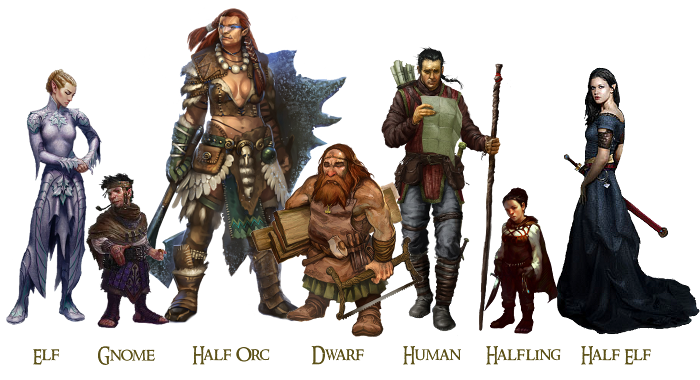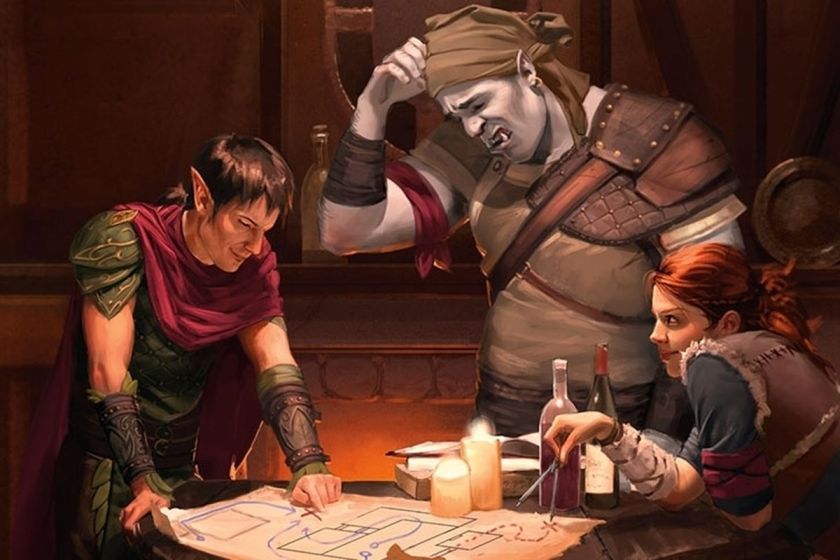Hey boss, it’s me, your employee! For some reason I think that we should play Dungeons & Dragons with the other employees here! You don’t really know what Dungeons & Dragons is, or why we should play it? That’s fine, I’ll tell you!
What is Dungeons & Dragons?
Dungeons & Dragons is what’s known as a tabletop role playing game. So a few people gather around a table, and play. But the thing is, it’s not a board game, or card game. It’s a little bit of a dice game, but not like Yahtzee, because the dice are all crazy shapes.

In this game, we all pretend that we are other people, usually fantastical creatures going on quests. Are you familiar with The Lord of the Rings? You can be a human, elf, dwarf, hobbit (halfling), and some other cool things too!

But you don’t just live like peasants, you are heroes on a fantastic journey, killing evil monsters, saving lives, exploring mystical lands, and getting awesome stuff!

Why Should We Play For Work?
Team Building
Consider it a new team building exercise! Sure we could go bowling, but then all we learn about each other is who is a better bowler, and who is a sore loser. In D&D, you actually work as a team to accomplish a single goal. You learn who is more creative, what prioritizes people, and how they deal with frustrations in a safe space.
In this game, you don’t win or lose. Just like you don’t win or lose at life. There are problems that come up, and you either accomplish solving those problems or you don’t, but you don’t get points for it, just like in D&D. This encourages camaraderie, because we have to work together at succeeding in a particular task, but if you don’t, you don’t together; and learn how to pick yourself up and keep going together. If we do win though, we win together as well.

Role Assignment
Everyone finds the roles that they fit in. Your job in your group isn’t given to you, like at work, but you pick it out! Do you want to be the person that charges in to a problem head first (Barbarian), or do you want to step back and make sure those people have what they need to succeed (Cleric). Maybe you can’t look at the whole problem at once because it overwhelms you, but you are able to take down this huge dilemma one piece at a time (Rogue). Or the opposite, you don’t know how to finish any one individual piece, but you can affect the whole thing, just a little bit (Wizard). Finding your roles more naturally help you find where you can help at work best, or which direction you should be focusing your career in how it fits in with the company.

Communciation
Communication is important in this game. In your work, if Jim thinks he knows the answer to a problem that Bob is having, Jim might not want to say anything because it’s not his problem, not his job. In D&D, the solving of problems can literally mean life or death (for your characters). Jim feels like he needs to speak up and give his two cents, and if you try Jim’s plan and it succeeds, it gives him the confidence needed at work, because he has proven that he might be able to help, and the more brains working on a problem, the better you’ll find the proper solution.

Dungeons & Dragons is a different kind of game, that forces you to think differently, and see each other differently. It’s always silly seeing your coworkers dressed casually, so just imagine them describing taking out a sword and killing goblins.
At the end of the day though, it’s because it’s fun, and if a coworker is trying to bring some fun in the workplace, can’t you at least give them a chance? All it takes is one night around a table, with some papers, pencils, and dice.
Still not convinced? Here are some other articles that agree!

yes! team building…? Good luck up at the GH! You’ll do great.
LikeLike
Thanks boss 🙂
LikeLike